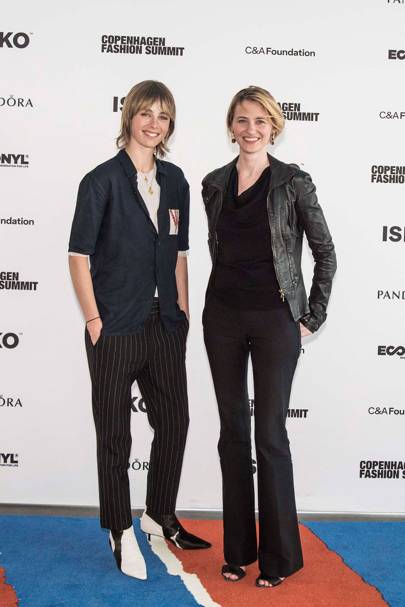“I’m optimistic,” Ziff tells Vogue over the phone from New York. “Top modelling agencies have expressed interest in joining the programme and our conversations to date have been encouraging.” As well as contacting agencies directly, the models have solicited the input of agency presidents to make sure that their founding principle – “human rights protections in corporate supply chains must be worker-driven and enforcement-focused" – is represented to companies comprehensively. Corporate social responsibility (CSR) has failed so far, she explains, because it “does not put workers – those whose rights are in question and who have the most direct knowledge of their working conditions – at the centre of developing and enforcing solutions to the problem.”
But, as Ziff, explains, she’s “been banging this drum for a long time”. She brought her shared concerns about predatory photographers to agencies and stakeholders almost a decade ago, and it’s only in the last few months that the people have been willing to listen. “Now that we've presented a solution that offers an equitable way by which everyone in our industry can be accountable for upholding the standards in which we all believe, I’m determined to see this work through.”
Change, for Ziff, has to come from the bottom up. When she started modelling, she took it upon herself to fight for basic child labour laws in New York because there were none. “It's strange to think that [models are] the most visible people in the supply chain, and yet we don't even have the most basic labour protections,” she told the Copenhagen Fashion Summit on the Respect Programme’s launch day. Since then, she has increasingly found that corporations “tend to treat the discovery of abuses as public relations crises to be managed, rather than human rights violations to be remedied.”
James Scully, casting director and Model Alliance advisory board member, who joined Ziff and fellow model Edie Campbell at last week’s summit, believes that it’s the very heart of the fashion industry that needs to change: "In [its] search for constant newness, it has created a culture much like fast fashion brands. It cycles through models as quickly as inexpensive T-shirts.”

But, because models are beautiful, and people associate their lives with the glossy magazine imagery and Instagram pictures, “[their] suffering is [seen] as less valuable than anyone who works in entertainment or the corporate structure of a fast-food chain,” he continued. Campbell agreed that “it's very difficult to be sympathetic towards somebody who you can see has had fame, fortune, success from a young age – or you might perceive has received those things.
“What’s lost is the realisation [that] those young men or women are often 17, maybe younger, very far away from home, don't speak English, are in debt, have taken a massive financial risk themselves in starting this career and [have] often been sold a dream that will never come to reality,” Campbell asserted.
Social media has been “triggering survivors to courageously speak out," Ziff said of the #MeToo movement at the summit. But with this courage has come a “backlash from industry figures who are denying the survivors' stories of abuse. Further, some victims are essentially being blacklisted for speaking out, and trying to prevent further abuse, while their harassers continue to work.” Scully also called out the people who are discrediting the models’ stories, and querying why it took models so long to tell their stories of mistreatment. “What I can only say is, if you've never been abused or you've never been assaulted, you can't answer that question and you have no right to ask anyone for a time frame… that's not how it works, everything is not black and white.”
The real question, he added, is, “why did we wait so long and turn our heads, and watch this disaster happen and do nothing about it?”. Now that we know the stories, how can we keep the momentum to make change?
“The fashion industry has been 'business as usual' for so long that signing on to the Respect Programme might seem scary, but a swell of support is on the rise,” an encouraged Ziff says over the phone. She’s backed up by Campbell, who said at the summit that initiatives, such as the Respect Programme, don’t “need to limit anybody's creativity… It's not about stopping people from doing the job that they love, it's about just taking the fear, the ego, the aggression, and the violence out of it.”
It doesn't need to be this heart-wrenching, really difficult thing everyone is going to agonise over… it's a big commitment but it doesn't need to be a terrifying one," Campbell added. As Ziff says, “It's the right time – and we're ready.” In the week the Model Alliance expects to hear back from major agencies, bring it on.
The real question, he added, is, “why did we wait so long and turn our heads, and watch this disaster happen and do nothing about it?”. Now that we know the stories, how can we keep the momentum to make change?
“The fashion industry has been 'business as usual' for so long that signing on to the Respect Programme might seem scary, but a swell of support is on the rise,” an encouraged Ziff says over the phone. She’s backed up by Campbell, who said at the summit that initiatives, such as the Respect Programme, don’t “need to limit anybody's creativity… It's not about stopping people from doing the job that they love, it's about just taking the fear, the ego, the aggression, and the violence out of it.”
It doesn't need to be this heart-wrenching, really difficult thing everyone is going to agonise over… it's a big commitment but it doesn't need to be a terrifying one," Campbell added. As Ziff says, “It's the right time – and we're ready.” In the week the Model Alliance expects to hear back from major agencies, bring it on.

No comments:
Post a Comment